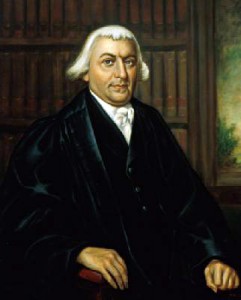 Supreme Court Justice James Iredell was nominated as an associate justice to the first United States Supreme Court by George Washington on February 10, 1990. He was confirmed by the United States Senate two days later. He was just 38 years old,the youngest justice appointed to the early Supreme Court.
Supreme Court Justice James Iredell was nominated as an associate justice to the first United States Supreme Court by George Washington on February 10, 1990. He was confirmed by the United States Senate two days later. He was just 38 years old,the youngest justice appointed to the early Supreme Court.
Iredell was born in England in 1751, and moved to the colonies in 1768, when he was 17 years old. He left to serve as King George III’s Comptroller of Customs in northeastern North Carolina. His family was poor, but his mother’s family helped him secure this position. While employed as comptroller, he studied law part time under Samuel Johnston, who later served as Governor of North Carolina and as a United States Senator.
Although he worked for the King, Iredell became a strong supporter of the American Revolution. At the age of 23, he published “To the Inhabitants of Great Britain”, an essay opposing parliamentary supremacy over the colonies. He asserted the individual’s right to liberty and the pursuit of happiness, which may have influenced the language later adopted in the Declaration of Independence.
After the revolution, Iredell was viewed as an influential Federalist, vociferously calling for North Carolina to ratify the constitution in the face of much opposition. It was probably his politics, as much as anything else, which caused Washington to appoint him to the Supreme Court at such a young age.
While on the bench, he is probably best known for his dissent in the case of Chisholm v. Georgia. Despite his strong federalist tendencies, this dissent is sometimes viewed as a strong embrace of state’s rights. However, his opinion should not be read as attacking the Supreme Court’s power of judicial review. Rather, his decision pointed out the limits of federal power set forth in the Constitution.
In fact, there are those who believe his writings and opinions asserting the Supreme Court’s power of judicial review were far superior to that later expounded by John Marshall in Marbury v. Madison. See “The Truth About Justice Iredells’ Dissent in Chisholm v. Georgia (North Carolina Law Review 1994) by John V. Orth and “James Iredell and the American Origins of Judicial Review“, a Connecticut Law Review article published by William R. Casto in 1995.
A modern biography of Iredell, simply entitled Justice James Iredell was written by Willis P. Whichard and published in 2000.
Iredell was a prolific letter writer. While riding circuit, “he would fuss at his family and friends if he wasn’t getting mail from them,” according to the Whichard biography. Now, his heirs are suing in a North Carolina court to have these valuable letters returned to the family.
He was a good friend of fellow Supreme Court Justice James Wilson, who died while visiting Iredell in North Carolina in 1798. Iredell suffered from poor health while on the bench, and his circuit riding duties took its toll on him physically. He died in 1799 at the age of 48.




{ 1 trackback }